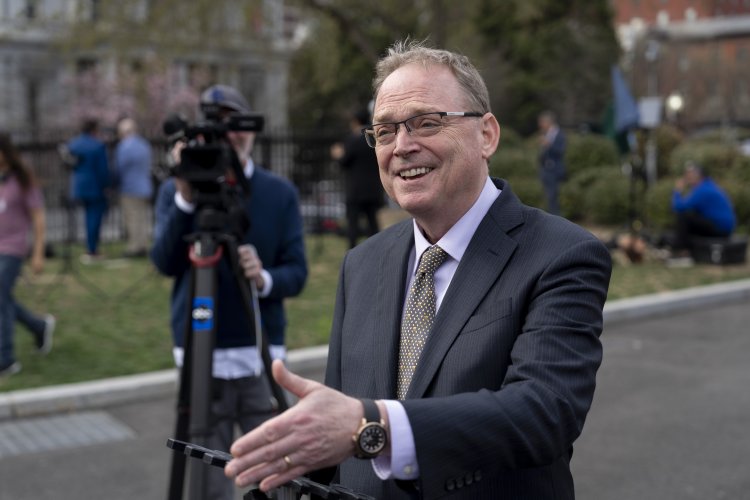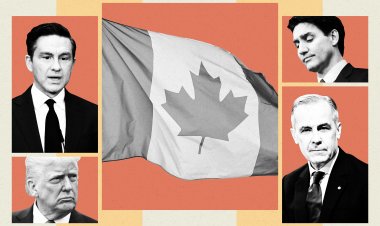US officials report that Trump is overwhelmed by trade talk requests
Brooke Rollins noted that countries are "burning" up the phone lines to discuss trade matters.

"We've got 50 countries that are burning the phone lines into the White House up," Agriculture Secretary Brooke Rollins stated on CNN's "State of the Union." "And probably the president's cell phone as well, and probably [Commerce Secretary] Howard Lutnick as well. And I've heard from some as well."
White House economic adviser Kevin Hassett also confirmed in an interview with George Stephanopoulos on ABC's "This Week" that he had been informed by the Office of the U.S. Trade Representative late Saturday night that "more than 50 countries have reached out to the president to begin a negotiation." However, neither Rollins nor Hassett disclosed which countries had made contact.
Trump's recent move to impose at least a 10 percent tariff on nearly every country, along with duties up to 50 percent on around 60 trading partners that the administration believes unfairly treat the U.S. in trade, led to a substantial stock market downturn and raised concerns about a possible recession due to increased consumer costs and foreign trade retaliation.
Moreover, Trump's administration has communicated mixed messages regarding the main intention behind the tariffs—whether they are designed to generate "trillions of dollars" in new revenue and promote domestic manufacturing, as Trump suggested, or to pressure countries into renegotiating to reduce their own tariffs and trade barriers. These two objectives are somewhat contradictory since striking deals to eliminate tariffs would reduce the revenue generated from them.
There has been no immediate information from the White House or USTR about the specific countries seeking talks, but several trading partners, including the 27-nation European Union, have indicated their interest in reaching an agreement. Reports indicate that Vietnam’s leader, To Lam, spoke with Trump last week after the tariff announcement and subsequently sent a letter requesting a 45-day extension to negotiate a deal.
China has been critical of Trump's actions, retaliating with 34 percent tariffs on U.S. goods, equivalent to the duties imposed by Trump on Chinese imports. This follows a 20 percent duty that Trump implemented earlier this year to push China to take action against the influx of fentanyl and related chemicals into the U.S.
The USTR, a relatively small agency with around 250 employees, faces challenges in responding swiftly to the influx of negotiation requests.
During an interview on NBC's "Meet the Press," Treasury Secretary Scott Bessent emphasized that the decision to negotiate lies with Trump, but cautioned against expectations for rapid agreements.
"Well, I think that's going to be a decision for President Trump," Bessent stated. "But I can tell you that as only he can do at this moment, he has created maximum leverage for himself. And more than 50 countries have approached the administration about lowering their non-tariff trade barriers, lowering their tariffs, stopping currency manipulation. And...you know, they've been bad actors for a long time. And it's not the kind of thing you can negotiate away in days or weeks."
Bessent also minimized concerns that the tariffs would lead to inflation, differentiating between a "one-time price adjustment" due to higher import taxes and "consistent" price increases. He referred to the recent stock market decline as an "adjustment" that does not necessarily indicate an impending recession.
"Who knows how the market is going to react in a day, in a week? What we are looking at is building the long-term economic fundamentals for prosperity," he remarked.
The baseline tariff of 10 percent took effect early Saturday morning, with the higher tariffs on around 60 trading partners set to begin early Wednesday.
In an interview on CBS' "Face the Nation," Lutnick ardently defended the tariffs, labeling them essential for the United States' long-term national security, while indicating that quick agreements to alter or eliminate the tariffs were unlikely.
"There is no postponing. They are definitely going to stay in place for days and weeks. That is sort of obvious. The president needs to reset global trade; everybody has a trade surplus and we have a trade deficit," Lutnick asserted.
"The tariffs are coming," he emphasized later in the interview, reiterating Trump's commitment: "He wasn't kidding. The tariffs are coming. Of course, they are."
Hassett also sought to downplay any adverse effects of the tariffs, stating that any resulting price increases would not be as significant as critics forecast. He critiqued past U.S. trade policy decisions, such as endorsing China's entry into the World Trade Organization, which he argued harmed wages and employment more than they benefitted prices. "We got the cheap goods at the grocery store, but then we had fewer jobs," he noted.
Former Treasury Secretary Larry Summers, who served under Presidents Bill Clinton and Barack Obama, labeled Trump's tariff move as "the biggest self-inflicted wound we put on our economy in history."
"We're increasing inflation because the prices are higher because of the tariffs that give people less spending power, fewer jobs," Summers said during an interview on "This Week."
"Markets are looking at all of that, and they think companies are going to be worth $5 trillion less than they thought before these tariffs started. And that's just the loss to companies; adding the loss to consumers, a reasonable estimate would probably be something like $30 trillion," he added.
Summers also criticized Trump's long-standing belief in the benefits of tariffs, equating it to "the economic equivalent of what creationism is to biology or what ending vaccines is to medicine."
"The question is whether his advisers are going to have the courage to tell him that and the courage to step away from being part of the policies," Summers remarked.
Allen M Lee for TROIB News
Find more stories on Business, Economy and Finance in TROIB business












